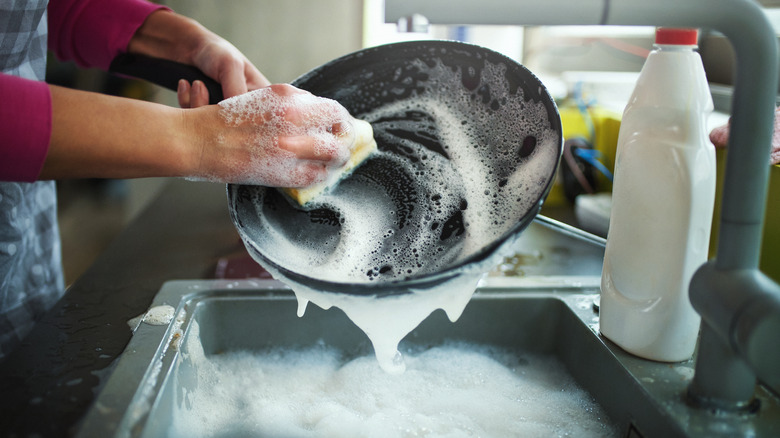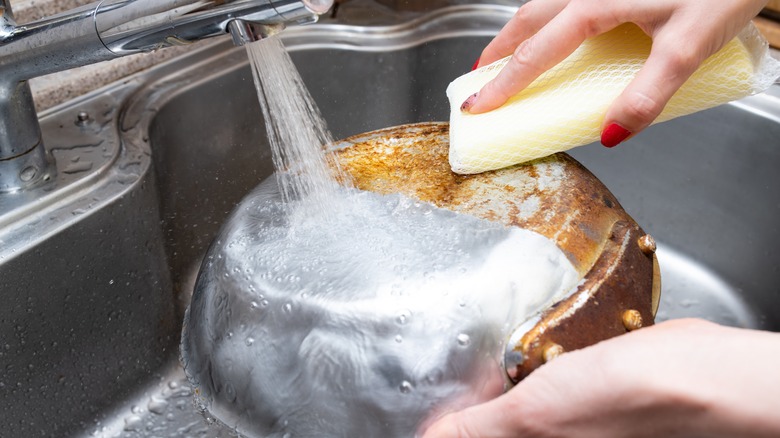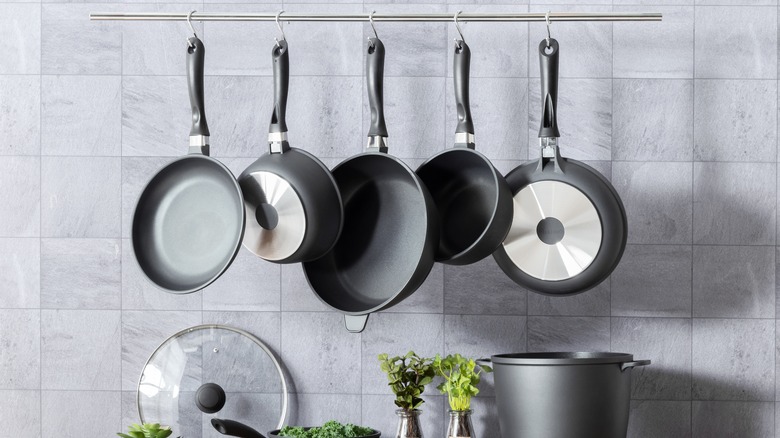The Cleaning Mistake That Will Destroy Your Favorite Frying Pan
When you're done cooking, it's tempting to run the hot pan under water to get rid of excess oil and debris, but don't rush to the sink just yet. Rinsing a hot pan with cold water is actually doing more harm than good.
Over time, rinsing your hot pan under cold water will lead to warping, which makes it extremely difficult to cook food evenly. On the more extreme side, cast iron pans can crack when shocked with cold water. Additionally, when an enamel or non-stick pan starts warping, the coating can start to chip off. These coatings can potentially be dangerous to ingest and may contain harmful chemicals (PFAS) that have been linked to cancer.
Next time you clean your pan, if you hear a sizzle when you rinse it, the pan is too hot or the water is too cold. Avoiding this mistake will lengthen the life of your pans and will keep your food safe and delicious.
What happens when you rinse a hot pan with cold water?
Like anything that gets hot, the materials of a frying pan expand when you cook with it. This reaction is not something you can see with your eyes but is happening on a molecular level. When a hot pan is hit with cold water, it goes through something called thermal shock, which is when materials are cooled off or heated up too quickly. The molecules retract so fast that they pull on each other and cause the whole pan to shrink, which is what leads to warping and unevenly cooked food. Warped pans are also a danger to cook with, as their unsteadiness increases the risk of accidents.
To avoid having to throw out your favorite pan, let the pan cool before rinsing, or rinse it with hot water. Once your pan has come to a cooler temperature, clean it with dish soap (or a natural alternative) and a gentle sponge. This simple step will prevent future warping and chipping, eliminating the need to replace your pans yearly.
More tips for taking care of your pans
Avoiding washing a hot pan isn't the only way to keep your pans looking like new. There are plenty of tips and tricks that can improve the longevity of your kitchen tools. If you typically stack your pans on each other in storage, place a tea towel in between each pan. Stacking pans on each other can scratch their surfaces and damage non-stick coatings. You can also protect your pans in storage by hanging them or storing them on a rack.
While cooking with your pans, avoid burning the surface. Be aware that some oils have low smoke points and will burn faster over high heat. When food and oil burn on pans, the surface can be severely stained and the non-stick coating will be damaged.
When cleaning your frying pans, make sure to use a soft sponge or brush. Harsh bristles can cause scratches on pans, which can lead to further enamel and coating chips. Once your pan is clean, always dry it completely before storing it. This tip will keep your pans looking shiny and new, which is great if you have them proudly displayed in your kitchen.



